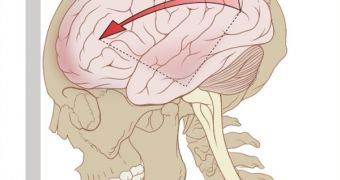Researchers with the Mayo Clinic in Rochester, Minnesota, say that a history of concussions increases the risk of people developing a neurodegenerative form of dementia called Alzheimer's disease later on in life. Only concussions that lead to loss of consciousness were found to contribute to this effect.
What the team discovered is that a richer history of concussions is positively correlated with a more significant buildup of plaques in the human brain, a phenomenon that has long ago been associated with the development of Alzheimer's.
This condition causes progressive memory and cognitive impairment and has no known cure. The origins and early progression of Alzheimer's are also heavily scrutinized. What researchers do know is that beta-amyloid proteins form the plaques that give the demented brain its distinctive appearance.
Details of the new investigation were published in the December 26 online issue of the American Academy of Neurology's (AAN) journal Neurology. The paper was authored by Mayo Clinic researcher Michelle Mielke, PhD, EurekAlert reports.
The research was conducted on 141 people with mild cognitive impairment – a precursor to Alzheimer's and other forms of dementia – and 448 healthy control subjects. All participants were asked to report any past instances of memory or consciousness loss due to brain injury.
MCI respondents who reported brain traumas had amyloid plaque levels 18 percent higher than those suffering from the same condition, but who did not experience traumatic brain injuries or concussions.
“Our results add merit to the idea that concussion and Alzheimer's disease brain pathology may be related. However, the fact that we did not find a relationship in those without memory and thinking problems suggests that any association between head trauma and amyloid is complex,” Mielke explains.
Funds for the investigation were provided by GE Healthcare, the Robert H. and Clarice Smith and Abigail van Buren Alzheimer's Disease Research Program, the National Institutes of Health, the Robert Wood Johnson Foundation.
Studying the emergence and progression of Alzheimer's is very important because the condition tends to affect seniors the most. As the population gets older, the incidence of dementia is expected to rise significantly and place a huge burden on healthcare systems.

 14 DAY TRIAL //
14 DAY TRIAL //